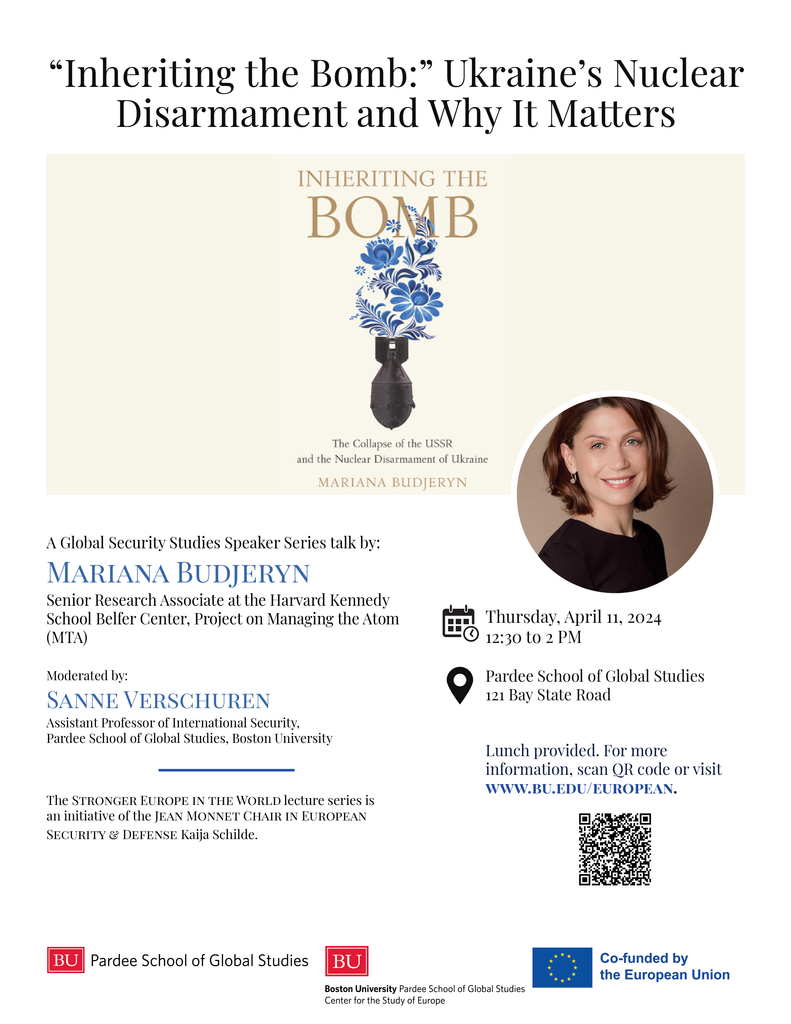“Inheriting the Bomb:” In (04/11/24)
Join us for a lecture by Mariana Budjeryn, Senior Research Associate at the Harvard Kennedy School Belfer Center, Project on Managing the Atom (MTA). Mariana is a senior non-resident fellow at the Brookings Institution and a member of the Committee on International Security and Arms Control of the National Academies of Sciences. Her research and analytical contributions have appeared in the Journal of Cold War Studies, Nonproliferation Review, Foreign Affairs, Washington Post, Boston Globe, Bulletin of the Atomic Scientists, War on the Rocks, and in the publications of the Woodrow Wilson International Center for Scholars where she is a Global Fellow. The subject of discussion will be Budjeryn’s new book, Inheriting the Bomb: The Collapse of the USSR and the Nuclear Disarmament of Ukraine (Johns Hopkins University Press, 2022).
Thursday, April 11, 204 • 12:30 to 2 PM
Pardee School of Global Studies, 121 Bay State Road
Lunch provided. Register here: https://bostonu.qualtrics.com/jfe/form/SV_6M4bwy7gKe8frts
[Add to calendar]
The collapse of the Soviet Union, a nuclear superpower, cast a shadow of ambiguity over the fate of the world’s largest nuclear arsenal. In 1991, the USSR’s colossal nuclear arsenal found itself on the territory of not one but four newly sovereign states: Belarus, Kazakhstan, the Russian Federation, and Ukraine. Russia’s succession to the Soviet Union’s status as a nuclear-weapons state under the Treaty on the Non-Proliferation of Nuclear Weapons (NPT) went uncontested. But the fate of nuclear arsenals of the non-Russian successors, Ukraine, in particular, became a matter of contestation and proliferation concern. Ukraine challenged Russia’s monopoly on the Soviet nuclear legacy, demanding recognition of its entitlement to the inherited nuclear arsenal as a successor state of the USSR. In negotiations with the United States and Russia, Ukraine struck a deal that included financial compensation for surrendered nuclear warheads and security assurances from nuclear powers. By the end of 1994, Ukraine joined the NPT and then transferred all nuclear warheads to Russia and dismantled all strategic delivery systems. Ukraine’s nuclear decisions gained new relevance after Russia, one of the nuclear states that pledged security assurances to Ukraine, invaded Ukraine in 2014 and again in 2022. Drawing on multi-archival sources, the book revisits the history and politics of Ukraine’s nuclear decision-making in the early 1990s in the hopes of contributing to a better understating of the causes, consequences, and present-day relevance of Ukraine’s nuclear renunciation.

This event takes place as part of the Pardee School of Global Studies’ Global Security Speakers Series. Co-sponsored by the Center for the Study of Europe as part of our “Europe in the World” series, an initiative of Kaija Schilde, Jean Monnet Chair in European Security and Defense. The aim of the Europe in the World series, supported by the European Union**, is to prompt critical reflection by a larger public on human and regional security informed by cross-national experiences and a variety of disciplinary lenses as well as to introduce or emphasize EU perspectives into ongoing debates around security integration and global challenges.
**Funded by the European Union. Views and opinions expressed are however those of the author(s) only and do not necessarily reflect those of the European Union or the Erasmus+ Programme. Neither the European Union nor the granting authority can be held responsible for them.
